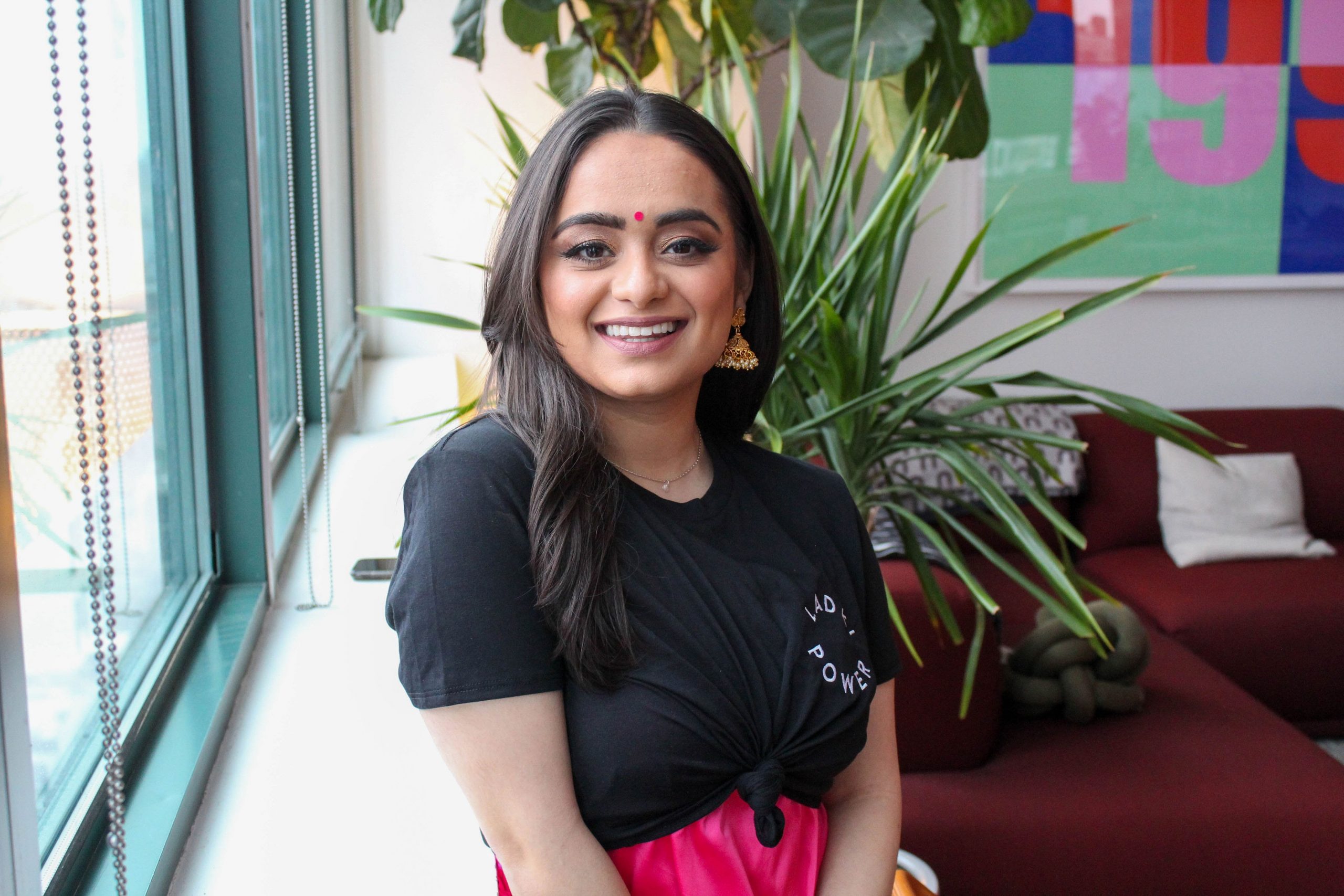The South Asian diaspora, an accumulation of generations of traditions, art, and stories from one of the oldest and richest cultures in the world, manifests in the lives of over 18 million immigrants from India, Pakistan, Bangladesh, Sri Lanka, Nepal, Bhutan & the Maldives living outside of their country of origin.
While the contributions of the diaspora have spanned many industries and geographies, South Asian womxn have largely been an invisible minority and underrepresented group in the workplace and the larger diversity landscape. At Neythri, a community created by and for South Asian womxn, our goal is to shine a spotlight on female leaders who have been overlooked for far too long.
Neythri exists to give South Asian womxn the community and support they need to succeed at work and beyond. South Asian women are changing the world by challenging gender and racial stereotypes in the workplace to build and invest in category-defining companies. The Black Lives Matter movement, which started to take center stage in 2020, underscores the need for increased dialogue about communities that have been overlooked, marginalized and/or oppressed. As a result, the need for organizations like Neythri to exist is paramount now more than ever.
Search less. Close more.
Grow your revenue with all-in-one prospecting solutions powered by the leader in private-company data.
Over the last few weeks, I’ve had the privilege of connecting with the incredible founders highlighted below and have been endlessly inspired by their stories, courage, and conviction.
Their motivations and formative experiences are varied – the death of a parent, redefining beauty, surviving a war, scaling businesses, the desire for technical freedom, daily parenting challenges, a side hustle that becomes a passion, the desire for financial independence, the inspiration from a newborn – but they are all united by their hunger to create and leave a lasting impact.
The greatest entrepreneurs start out with a singular vision of wanting to solve a problem, and it is from this that category-defining companies are created. The founders spotlighted below exemplify this exact ethos and I couldn’t be more excited to amplify the work they’re doing.
Take a look below to meet 9 incredible South Asian female entrepreneurs that are changing the game 👇
Priya Abani – CEO of AliveCor
Why I became a CEO: I didn’t decide to become a CEO in general, I decided to become the CEO at AliveCor. That difference is important to me. After my father’s passing, I felt a strong pull to use my experience and knowledge toward something I am passionate about—healthcare. AliveCor struck a chord with me because of how life-changing this technology is and the profound impact it can have on people’s lives. It’s a company full of brilliant, dedicated, and thoughtful people from different disciplines that work together to make a difference in the world. How could I not want to be part of that?
What Being South Asian Means To Me: At 21 years old I immigrated to the U.S. to get my master’s degree, and even though I was leaving my family back in India, they encouraged me to chase my dreams. Something that is very important and unique in Indian culture is the strong relationship with your elders, and I can tell you that those relationships have truly shaped my life. The ambition and perseverance instilled in me has helped me not only further my own career but has become foundational to how I mentor others. These values are what moved me to lead a company that’s making a real difference and build a career that allows me to be bold and challenge boundaries. That’s something I know my elders would be proud of, and I credit them for fostering in me the values that got me here.
What I Learned From Fundraising: Find a partner firm that truly believes in the long-term success of your mission. Finding the right partner who aligns with your vision is more important than entertaining any deal that knocks on your door. That partner should challenge you to grow your business model in new ways, while keeping the integrity of your brand and services in mind. I have always said that I want to partner with leaders that will help this enterprise and brand thrive beyond my time, and that’s exactly what we’ve cultivated here at AliveCor.
Deepica Mutyala – Founder & CEO of Live Tinted
Why I Became An Entrepreneur: Growing up in a traditional South Indian family in Texas, I never saw myself represented in the media. I grew up thinking that I wasn’t beautiful because the standards of beauty that were propagated in mainstream media did not reflect people who looked like me. This is why I wanted to create a beauty brand and be a CEO from the age of 16. Conquering the world of business meant that I could be the role model to other young girls that I never had growing up and that’s what makes this all worth it.
What Being South Asian Means To Me: My immigrant parents gave up everything so their children could have the best life possible. This instilled in me the grind and motivation to be resilient regardless of what gets thrown at me so I can make them proud every step of the way. Culturally speaking, my South Asian identity bleeds into every part of my life, so much so that it’s embedded in the DNA of my beauty brand! It took me a while to get here though – growing up, I wanted to fit in so I tried to hide my culture and Indian-ness as much as possible. I didn’t recognize until later that my identity is the reason I am who I am, and that deserves to be celebrated and not hidden.
What I Learned From Fundraising: For Live Tinted, bringing in strategic angels was an intentional decision because I didn’t want big checks from one fund; I wanted to retain control over all the key decisions in the company. As a result, one of the best pieces of advice I can give is not to get caught up on fundraising as the only way to build a successful business. Although that assumes that people do have the capital to start their own businesses, it’s important to understand that fundraising is simply the means to an end, not the end itself. Founders should bring in outside capital onto their cap table only if there’s a strategic reason to do so beyond just capital that will move their business forward.
Somya Kapoor – Founder & CEO of Stealth
Why I Became An Entrepreneur: My entrepreneurship story starts with the need to solve a problem and see an idea or solution be implemented. At every company I worked at, what drew me in was seeing customers with a product that I built. I was on incubation teams for the majority of my career where I was spinning out new teams and products within the larger company and launching them. I’ve always wanted to start a company from a young age as I’m someone who jumps into action to put an idea I’m passionate about into the world.
What Being South Asian Means To Me: My family and I went through the Gulf War when I was 10 in the Middle East. After being on the run for 21 days with no food, we somehow found our way back to India after fleeing from Kuwait. That was a very formative experience in my life. Now, my survival instinct kicks in when I go to any major job interview or make any big career decision. I constantly reinforce that all of this was a piece of cake compared to what I went through earlier in my life. The resilience that I was able to develop as a result of my survival instinct laid the foundation for my entrepreneurial journey.
What I Learned From Fundraising: For better or worse, VC is a highly networked community, so it’s hard to get funded if you can’t break into that community. I was lucky enough to already have a network of investors from being in the tech world for a while. Based on my experiences, some advice I would give would be to go in prepared. It’s not enough to go in with just an idea and a couple of slides; founders need to show a clear path to executing on their vision. I would also suggest practicing with VCs as much as possible before actively fundraising. I found this exercise super helpful as they helped me streamline and iterate how I positioned the business. Lastly, don’t BS as it gets caught very quickly.
Ridhi Tariyal – Founder & CEO of NextGenJane
Why I Became An Entrepreneur: I started my career on Wall Street at Banc of America Securities with stints in consulting and pharma afterward. Working on drug development as my first foray into healthcare helped me understand this industry’s nuances really well. However, I discovered quickly that innovation in genomics was happening at smaller biotech companies and startups. I spent a summer in India after graduating from HBS and before my final year at MIT, where I did an internship at a startup. During my startup internship, I realized that the intersection of startups and healthcare was where problems were being solved at a scale which was exciting to me. That’s where my startup career began and the rest is history.
What Being South Asian Means To Me: I distinctly remember a train ride during my summer in India from Delhi and Dehradun which is an approximately 6-hour trip, where I just people watched. There was a chaiwalla (tea seller) that came through the train to sell to you directly in your seat. When this happens, the train fills up with the wonderful smell of Indian food and cardamom and you get immersed. It was a visual feast to be able to experience the vibrancy and beauty of this country that I and my family are able to call ours.
What I Learned From Fundraising: It’s so important to learn when to not waste time with investors who have made up their mind that they aren’t going to invest. According to a study by Docsend, if investors want to invest, they will speed through the deck and spend more time on the financial slides to look at share price, valuation, etc. as they have reached conviction and are trending towards making an investment. If they’re not convinced on the business, you’ll notice that they spend time on all the other slides to look for an out. Trying to move the needle with people who have already decided to say “no” or can’t quite get to a “yes” can really hurt your fundraise.
Nikita Gupta – Co-founder & CTO of Symba
Why I Became An Entrepreneur: While I had internship experiences at places like Apple, Bank of America, and Martha Stewart, I realized that a job wouldn’t give me the technical freedom I craved. I wanted to be able to build products that excite me on my own terms. So to get a taste of startup life, I was employee #30 at a startup in Washington DC where I worked right under the CTO, and I was hooked. Eventually, I met Ahva (my co-founder) and started helping her out part-time as we ideated on what would eventually become Symba!
What Being South Asian Means To Me: Growing up, India was a huge part of my life as I grew up quite religious, always surrounded by Indian food and a large and supportive community of Indian family and friends by my side. Much like every other desi kid, I’ve been taught the value of hard work and discipline from a very young age. This has enabled me to learn how to adapt to stressful situations and make the most of them. I love who I am and embrace my South Asian identity wholeheartedly (in addition to being American)!
What I Learned From Fundraising: Most of the advice I can give relates back to my own experiences with fundraising. We were a little naive throughout the whole process and I think that this is something that a lot of other underrepresented founders go through. We could have asked for a higher valuation cap, especially for investors who came into the round months after other investors who committed. It’s important for founders to remember their agency during this process – investors need us as much as, if not more than, we need them. It’s also important to call out the obvious double standard in the fundraising market for women and POC founders. The more people that recognize it, the more we have the ability to solve it.
Ritu Narayan – Founder & CEO of Zum
Why I Became An Entrepreneur: I can’t sit idle when I know there’s a problem to be solved as I enjoy using my energy to contribute to positive things. Early in my career, I was able to see how iconic companies like Ebay transform the world, but it struck me how there are so many simple problems that are still waiting to be solved. This is where Zum originated. When my younger child started going to preschool, pick up and drop off became a huge problem for me. It led me to wonder why something didn’t exist to solve the problem of school transportation for parents. I decided to go to Stanford GSB with the singular goal of learning the business fundamentals that helped me build what is Zum today.
What Being South Asian Means To Me: Being South Asian greatly influenced my identity because of the importance of work ethic that was drilled into me from Day 1. I was the first woman in my extended family to go into computer engineering. The most satisfying part for me was not just that I completed the program but that a generation of women in my family and community were inspired to pursue engineering as well. Seeing these women was a big part of what inspired me to start Zum, where our mission is to empower women using technology.
What I Learned From Fundraising: At the early stages, every round of capital you raise is a ticket that allows you to continue your journey to the next round. I would advise founders (especially women and/or POC) to be laser-focused on the metrics you need that will enable you to raise subsequent rounds. Track these metrics meticulously and be relentless about making sure that you reach them. While it is important to be a great storyteller, the proof is in the pudding, and showing you can execute on the promise you’re making is paramount.
Trisha Sakhuja Walia – CEO of Brown Girl Magazine


Why I Became An Entrepreneur: I never knew I would or could become an entrepreneur. That wasn’t a part of the plan. I thought I would graduate from law school, work as counsel for a media company, and perhaps run for local office. That all changed when BrownGirlMagazine.com took over my life and I had the perfect opportunity to go full-time with a passion and side hustle I could no longer deny. Running a small business now for more than two years, I can say it’s one of the greatest blessings and biggest burdens. Paying yourself is the hardest job, keeping your books and legal to-dos in-check is a task we need to talk about more, and keeping your team’s morale and motivation at an all-time high is a marathon.
What Being South Asian Means To Me: Being South Asian is the foundation of my hyphenated life in America and the birth of my career. Bridging the gap between our two worlds and lives continuously motivates me in our day-to-day. From starting the first-ever South Asian student-run club in high school to organizing hundreds of events in college for and with brown students and pursuing BrownGirlMagazine.com full-time, I’ve done everything possible to pave the way for more immigrant South Asian millennials to have space in mainstream America.
What I Learned From Fundraising: Having a lean operation is one aspect of the company I am truly proud of. Building a healthy, sustainable, mission-driven, technology-enabled small business is a marathon so before you spend thousands of dollars in marketing, build a robust, organic network that would be willing to buy your products, run ads on your platform, and put a dollar behind your brand organically. The only way to do so is to consistently share your content and values, listen to your audience’s needs and wants, and have an open mind to pivot.
Bindu Reddy – Founder & CEO of Abacus AI
Why I Became An Entrepreneur: After seeing and scaling hypergrowth companies from the inside, I wanted to do it myself. After a stint at a startup called Exelixis, I joined Google instead in 2005 because I heard that you had the freedom to pursue your own ideas and build them at Google. To me, this was the reward (the experience of building products that could change the world) without the risk associated with it (as Google was a very stable company to work for). I was always taken with the idea of inventing things and exploring cultures and growth of organizations over time – something I learned from my time at Google and Amazon. When I eventually quit to start Abacus, these learnings propelled my growth as a founder.
What Being South Asian Means To Me: Indian women are strong, opinionated, and independent. Growing up, my singular goal was to be financially independent and secure so I wouldn’t have to depend on my husband. In high school, that translated to wanting to get a job and own an apartment but I was terrified that it wouldn’t happen. While kids in the US grow up wanting to start companies, I (like many other South Asians) prioritized getting a job as we are taught to want stability and security over everything else. This defined a huge part of my identity and subsequent career decisions as I always evaluated the risk-return tradeoff before making any big decision.
What I Learned From Fundraising: It’s important to be comfortable with rejection as fundraising is a hard process and there’s a very small number of companies that end up getting venture funded. To be in the best position to do this successfully, do the leg work BEFORE you start the process. While you’re going through the process, keep a list of objections and figure out how you’re going to handle them for every subsequent pitch.
Radhika Patil – Founder & CEO of Cradlewise
Why I Became An Entrepreneur: Coming from a Gujarati family, dinner table conversations growing up were all about business and entrepreneurship. To me, it was a foregone conclusion that I would become an entrepreneur one day. Even when I had a job, my heart was always in starting something new. My husband and I always think about better ways to do everything, and how we can leverage innovation to solve the problems that we’re seeing around us every day. When my husband and I had our first child, we built something for her that ended up turning into a venture. At the beginning, we built Cradlewise in conjunction with full-time jobs and a new baby and then eventually went full-time 2 years in.
What Being South Asian Means To Me: My father has been a major source of encouragement for me throughout my life as he pushed me to leave my job and pursue entrepreneurship. I’m lucky in that I was able to have the support system in my family to pursue this once-in-a-lifetime opportunity to build a company. My upbringing and family was a critical part of this support system, coming from a culture that celebrated entrepreneurship.
What I Learned From Fundraising: My husband and I are proof that you don’t need a network to fundraise as our primary method of outreach was going in cold. If there’s one piece of advice I can give, it’s to treat fundraising like a product launch – test a message, see if it works, if it does, double down on it and if it doesn’t, iterate and try something else. In addition, it’s so important to have a support system. This process is so draining, especially if you don’t have prior access into the community. Find someone who can be a shoulder to cry on and bounce ideas off of whether it be your partner, co-founder, friends, mentors, or advisors. Ultimately, the startup journey is so freaking hard. Given that founders have to make about 10 life-threatening decisions every day, it’s important to recognize that all 10 outcomes can and won’t be perfect. And that’s perfectly okay.
To learn more about Neythri, check out this Q&A with the founders, Sruthi Ramaswami, Mythili Sankaran and Chitra Nayak.







